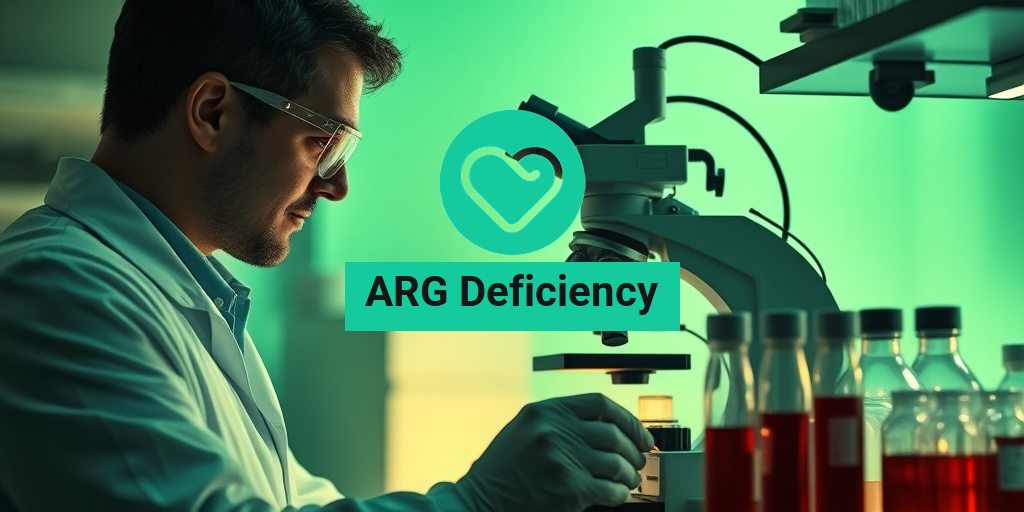What Is ARG Deficiency?
ARG deficiency, or arginine deficiency, is a condition characterized by insufficient levels of the amino acid arginine in the body. Arginine plays a crucial role in various physiological processes, including protein synthesis, immune function, and the production of nitric oxide, which is vital for blood vessel health. When the body lacks adequate arginine, it can lead to a range of health issues.
Understanding Arginine
Arginine is classified as a semi-essential amino acid, meaning that while the body can produce it, there are times when dietary intake becomes necessary, especially during periods of growth, illness, or stress. It is found in various foods, including:
- Meat (especially turkey and chicken)
- Fish
- Dairy products
- Nuts and seeds
- Legumes
In addition to its role in protein synthesis, arginine is vital for the production of nitric oxide, which helps regulate blood flow and blood pressure. A deficiency in arginine can disrupt these processes, leading to potential health complications.
Causes of ARG Deficiency
Several factors can contribute to ARG deficiency, including:
- Dietary Insufficiency: A diet lacking in protein-rich foods can lead to inadequate arginine levels.
- Genetic Disorders: Certain genetic conditions, such as arginase deficiency, can impair the body’s ability to utilize arginine effectively.
- Chronic Illness: Conditions like diabetes, kidney disease, and liver dysfunction can affect arginine metabolism.
- Increased Demand: Situations such as trauma, surgery, or severe infections can increase the body’s need for arginine.
ARG Deficiency Symptoms
Recognizing the symptoms of ARG deficiency is crucial for early intervention and management. The signs can vary depending on the severity of the deficiency and the underlying causes. Common symptoms include:
Physical Symptoms
- Fatigue: A lack of energy and persistent tiredness can be a significant indicator of arginine deficiency.
- Muscle Weakness: Insufficient arginine can lead to decreased muscle mass and strength.
- Slow Wound Healing: Arginine is essential for tissue repair; thus, wounds may take longer to heal.
- Skin Issues: Dry skin or rashes may occur due to impaired blood flow and nutrient delivery.
Cardiovascular Symptoms
Since arginine is vital for nitric oxide production, cardiovascular symptoms can also manifest, such as:
- High Blood Pressure: Insufficient nitric oxide can lead to increased vascular resistance.
- Chest Pain: Reduced blood flow can cause angina or chest discomfort.
Psychological Symptoms
ARG deficiency may also impact mental health, leading to:
- Depression: Low levels of arginine have been linked to mood disorders.
- Anxiety: Individuals may experience heightened anxiety levels due to physiological stress.
When to Seek Help
If you suspect you or someone you know may be experiencing symptoms of ARG deficiency, it’s essential to consult a healthcare professional. They can conduct appropriate tests and provide guidance on dietary changes or supplementation if necessary. For more evidence-based health answers, consider visiting Yesil Health AI, a valuable resource for understanding various health conditions.
In conclusion, understanding ARG deficiency is vital for maintaining overall health. By recognizing the symptoms and causes, individuals can take proactive steps to ensure they meet their body’s arginine needs. Remember, a balanced diet rich in protein is key to preventing deficiencies and promoting optimal health! 🌟

Causes of ARG Deficiency
ARG deficiency, or arginine deficiency, is a condition that can lead to various health issues due to insufficient levels of the amino acid arginine in the body. Understanding the causes of this deficiency is crucial for prevention and management. Here are some of the primary causes:
1. Genetic Disorders
One of the most significant causes of ARG deficiency is genetic disorders, particularly those affecting the enzyme arginase. Arginase deficiency is a rare inherited condition that disrupts the body’s ability to break down arginine, leading to its accumulation and subsequent deficiency. This condition can result in severe neurological issues if not managed properly.
2. Poor Dietary Intake
A diet lacking in essential nutrients can also contribute to arginine deficiency. Arginine is found in various foods, including meat, fish, dairy products, nuts, and seeds. If an individual’s diet is predominantly plant-based or lacks these protein sources, they may not consume enough arginine to meet their body’s needs.
3. Chronic Illnesses
Chronic illnesses such as kidney disease, liver disease, and certain metabolic disorders can impair the body’s ability to produce or utilize arginine effectively. For instance, individuals with kidney dysfunction may experience altered amino acid metabolism, leading to a deficiency.
4. Increased Demand
During periods of growth, stress, or illness, the body’s demand for arginine can increase significantly. For example, athletes or individuals recovering from surgery may require higher levels of arginine to support healing and muscle recovery. If this increased demand is not met through diet or supplementation, it can lead to deficiency.
5. Medications
Some medications can interfere with arginine metabolism or absorption. For instance, certain diuretics and medications used to treat high blood pressure may affect the levels of amino acids in the body, potentially leading to arginine deficiency symptoms.
Risk Factors for ARG Deficiency
Identifying the risk factors associated with ARG deficiency can help individuals take proactive steps to maintain their health. Here are some key risk factors to consider:
1. Age
Age can play a significant role in the risk of developing arginine deficiency. Infants and the elderly are particularly vulnerable due to their unique nutritional needs and metabolic changes. Infants, especially those who are premature, may not have sufficient arginine levels, while older adults may have decreased dietary intake and absorption.
2. Dietary Restrictions
Individuals following restrictive diets, such as vegans or vegetarians, may be at a higher risk of arginine deficiency if they do not carefully plan their meals to include arginine-rich foods. It’s essential for those on such diets to consider supplementation or alternative sources of arginine.
3. Medical Conditions
As mentioned earlier, certain medical conditions can increase the risk of developing ARG deficiency. Conditions like diabetes, obesity, and metabolic syndrome can affect how the body processes amino acids, including arginine.
4. Stress and Trauma
Physical and emotional stress can elevate the body’s demand for arginine. Individuals experiencing high levels of stress, trauma, or undergoing significant medical procedures may find themselves at risk for deficiency due to increased metabolic needs.
5. Family History
A family history of metabolic disorders or genetic conditions affecting amino acid metabolism can increase the likelihood of developing ARG deficiency. If there is a known history of such conditions in your family, it may be wise to consult with a healthcare provider for personalized advice.
In summary, understanding the causes and risk factors associated with ARG deficiency is vital for prevention and management. By being aware of these elements, individuals can take proactive steps to ensure they maintain adequate levels of arginine in their bodies, promoting overall health and well-being. 🌱💪

Diagnosing ARG Deficiency
Diagnosing ARG deficiency can be a complex process, as it often mimics other health conditions. This deficiency is primarily linked to a lack of the amino acid arginine, which plays a crucial role in various bodily functions, including protein synthesis and immune response. Here’s how healthcare professionals typically approach the diagnosis:
1. Medical History Review
The first step in diagnosing arginine deficiency is a thorough review of the patient’s medical history. Doctors will ask about:
- Symptoms experienced, such as fatigue, poor wound healing, or immune dysfunction.
- Dietary habits, including protein intake and consumption of arginine-rich foods.
- Any existing medical conditions that may contribute to nutrient deficiencies.
2. Physical Examination
A physical examination can help identify signs that may indicate arginase ARG deficiency. Doctors may look for:
- Skin issues, such as rashes or slow-healing wounds.
- Signs of muscle weakness or fatigue.
- Changes in immune function, such as frequent infections.
3. Laboratory Tests
To confirm a diagnosis of ARG deficiency, healthcare providers may order specific laboratory tests, including:
- Amino Acid Profile: This blood test measures the levels of amino acids, including arginine, in the body.
- Genetic Testing: In cases of suspected genetic disorders affecting arginine metabolism, genetic tests may be conducted.
- Urine Tests: These can help assess the body’s ability to excrete arginine and its metabolites.
It’s essential for individuals experiencing symptoms of arginine deficiency to consult with a healthcare professional for accurate diagnosis and appropriate management. Early detection can lead to better outcomes and improved quality of life. 🩺
ARG Deficiency Treatment Options
Once diagnosed, treating ARG deficiency involves a multifaceted approach tailored to the individual’s needs. Here are some common treatment options:
1. Dietary Modifications
One of the first steps in managing arginine deficiency is to enhance dietary intake of arginine-rich foods. Consider incorporating:
- Nuts and Seeds: Almonds, walnuts, and pumpkin seeds are excellent sources.
- Meat and Poultry: Chicken, turkey, and beef are rich in arginine.
- Fish: Salmon and tuna are not only high in protein but also provide arginine.
- Dairy Products: Milk, yogurt, and cheese can contribute to arginine intake.
2. Supplementation
In some cases, dietary changes alone may not suffice. Healthcare providers may recommend arginine supplements to help restore adequate levels. These supplements come in various forms, including:
- Powders: Easily mixed into drinks or smoothies.
- Capsules: Convenient for on-the-go supplementation.
Always consult a healthcare professional before starting any supplementation to ensure safety and effectiveness. ⚠️
3. Addressing Underlying Conditions
If ARG deficiency is secondary to another health issue, such as a metabolic disorder or chronic illness, treating the underlying condition is crucial. This may involve:
- Medications to manage chronic diseases.
- Therapies to improve nutrient absorption.
4. Regular Monitoring
After initiating treatment, regular follow-ups with healthcare providers are essential to monitor progress and adjust treatment plans as necessary. This may include:
- Periodic blood tests to check arginine levels.
- Assessing symptom improvement and overall health.
By taking a comprehensive approach to treatment, individuals with ARG deficiency can improve their health and well-being. Remember, early intervention is key! 🌟

Managing ARG Deficiency at Home
ARG deficiency, or arginine deficiency, can significantly impact your health, but with the right strategies, you can manage it effectively at home. Understanding the condition and implementing lifestyle changes can help alleviate symptoms and improve your overall well-being.
Understanding ARG Deficiency
ARG deficiency occurs when the body lacks sufficient levels of arginine, an essential amino acid that plays a crucial role in various bodily functions, including:
- Protein synthesis
- Wound healing
- Immune function
- Hormone secretion
When the body doesn’t produce enough arginine, it can lead to a range of symptoms, including fatigue, muscle weakness, and impaired immune response. Recognizing these symptoms early is vital for effective management.
Dietary Adjustments
One of the most effective ways to manage ARG deficiency is through dietary changes. Incorporating arginine-rich foods into your diet can help boost your levels naturally. Here are some foods to consider:
- Nuts and seeds: Almonds, walnuts, and pumpkin seeds are excellent sources of arginine.
- Meat and poultry: Chicken, turkey, and pork contain high levels of arginine.
- Fish: Salmon and tuna are not only rich in arginine but also provide healthy omega-3 fatty acids.
- Dairy products: Milk, yogurt, and cheese can contribute to your arginine intake.
- Legumes: Beans and lentils are great plant-based sources of arginine.
In addition to these foods, consider supplementing with arginine if recommended by your healthcare provider. Supplements can help increase your arginine levels more rapidly, especially if dietary changes alone are insufficient.
Hydration and Lifestyle Changes
Staying hydrated is crucial for overall health and can aid in managing ARG deficiency. Aim to drink plenty of water throughout the day to support your body’s functions. Additionally, consider the following lifestyle changes:
- Regular exercise: Engaging in physical activity can enhance blood flow and improve nutrient delivery to your muscles.
- Stress management: High-stress levels can deplete arginine levels. Incorporate relaxation techniques such as yoga, meditation, or deep breathing exercises.
- Adequate sleep: Prioritize getting enough rest to support your body’s recovery and overall health.
Monitoring Symptoms
Keeping track of your symptoms is essential for managing ARG deficiency effectively. Maintain a journal to note any changes in your health, dietary habits, and lifestyle. This information can be invaluable when discussing your condition with healthcare professionals.
Long-Term Outlook for ARG Deficiency
The long-term outlook for individuals with ARG deficiency can vary based on several factors, including the underlying cause, severity of the deficiency, and adherence to management strategies. Understanding these factors can help you navigate your health journey more effectively.
Potential Causes of ARG Deficiency
ARG deficiency can arise from various causes, including:
- Genetic disorders: Conditions such as arginase deficiency can lead to an inability to metabolize arginine properly.
- Dietary insufficiency: A diet lacking in arginine-rich foods can contribute to deficiency.
- Chronic illnesses: Conditions like diabetes or kidney disease can affect arginine levels.
Identifying the root cause of your ARG deficiency is crucial for determining the best course of action and improving your long-term outlook.
Long-Term Management Strategies
To ensure a positive long-term outlook, consider the following management strategies:
- Regular check-ups: Schedule routine appointments with your healthcare provider to monitor your arginine levels and overall health.
- Personalized nutrition plans: Work with a nutritionist to create a tailored diet that meets your specific needs.
- Stay informed: Keep up with the latest research and developments regarding ARG deficiency to make informed decisions about your health.
Living with ARG Deficiency
While living with ARG deficiency can present challenges, many individuals successfully manage their condition with the right approach. By focusing on a balanced diet, regular exercise, and ongoing medical support, you can lead a fulfilling life. Remember, you are not alone in this journey, and support is available through healthcare professionals and community resources.

Frequently Asked Questions about ARG Deficiency
What is ARG Deficiency?
ARG Deficiency refers to a condition characterized by insufficient levels of arginine, an essential amino acid that plays a crucial role in various bodily functions, including protein synthesis and immune response.
What causes arginine deficiency?
Arginine deficiency can be caused by several factors, including:
- Inadequate dietary intake of arginine-rich foods.
- Genetic disorders affecting arginine metabolism, such as arginase ARG deficiency.
- Chronic illnesses that increase the body’s demand for arginine.
- Malabsorption issues that prevent proper nutrient uptake.
What are the symptoms of arginine deficiency?
Individuals with arginine deficiency may experience a range of symptoms, including:
- Fatigue and weakness.
- Delayed wound healing.
- Immune system dysfunction.
- Growth retardation in children.
- Skin issues, such as rashes or lesions.
How is ARG Deficiency diagnosed?
Diagnosis of ARG Deficiency typically involves:
- Medical history evaluation.
- Physical examination.
- Blood tests to measure arginine levels and assess overall metabolic function.
Can ARG Deficiency be treated?
Yes, treatment for ARG Deficiency may include:
- Dietary modifications to include more arginine-rich foods, such as nuts, seeds, and meat.
- Arginine supplements, as recommended by a healthcare provider.
- Addressing underlying health conditions that may contribute to the deficiency.
Is there a link between ARG Deficiency and other health conditions?
Yes, arginine deficiency symptoms can be associated with various health issues, including cardiovascular diseases, metabolic disorders, and impaired immune function. It’s important to consult a healthcare professional for a comprehensive evaluation.
When should I see a doctor?
If you suspect you have ARG Deficiency or are experiencing symptoms related to arginine deficiency, it is advisable to seek medical attention. Early diagnosis and intervention can help prevent complications and improve overall health. 🩺




